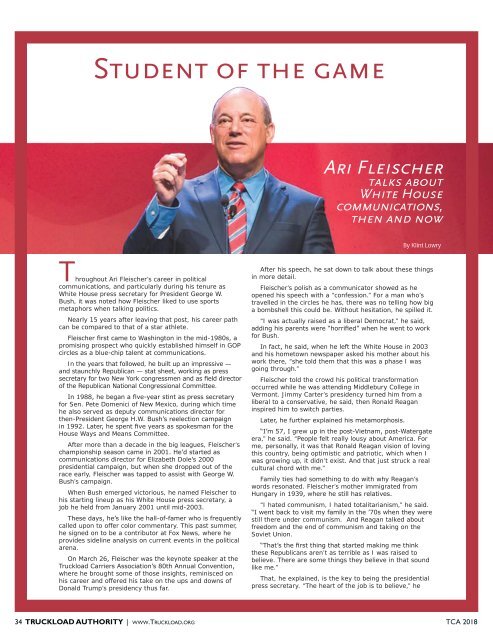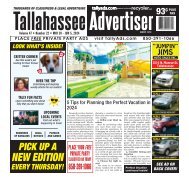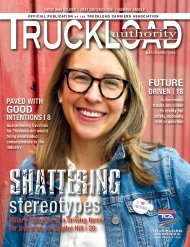TLA30_AllPages_RED
You also want an ePaper? Increase the reach of your titles
YUMPU automatically turns print PDFs into web optimized ePapers that Google loves.
Student of the game<br />
Ari Fleischer<br />
talks about<br />
White House<br />
communications,<br />
then and now<br />
By Klint Lowry<br />
Throughout Ari Fleischer’s career in political<br />
communications, and particularly during his tenure as<br />
White House press secretary for President George W.<br />
Bush, it was noted how Fleischer liked to use sports<br />
metaphors when talking politics.<br />
Nearly 15 years after leaving that post, his career path<br />
can be compared to that of a star athlete.<br />
Fleischer first came to Washington in the mid-1980s, a<br />
promising prospect who quickly established himself in GOP<br />
circles as a blue-chip talent at communications.<br />
In the years that followed, he built up an impressive —<br />
and staunchly Republican — stat sheet, working as press<br />
secretary for two New York congressmen and as field director<br />
of the Republican National Congressional Committee.<br />
In 1988, he began a five-year stint as press secretary<br />
for Sen. Pete Domenici of New Mexico, during which time<br />
he also served as deputy communications director for<br />
then-President George H.W. Bush’s reelection campaign<br />
in 1992. Later, he spent five years as spokesman for the<br />
House Ways and Means Committee.<br />
After more than a decade in the big leagues, Fleischer’s<br />
championship season came in 2001. He’d started as<br />
communications director for Elizabeth Dole’s 2000<br />
presidential campaign, but when she dropped out of the<br />
race early, Fleischer was tapped to assist with George W.<br />
Bush’s campaign.<br />
When Bush emerged victorious, he named Fleischer to<br />
his starting lineup as his White House press secretary, a<br />
job he held from January 2001 until mid-2003.<br />
These days, he’s like the hall-of-famer who is frequently<br />
called upon to offer color commentary. This past summer,<br />
he signed on to be a contributor at Fox News, where he<br />
provides sideline analysis on current events in the political<br />
arena.<br />
On March 26, Fleischer was the keynote speaker at the<br />
Truckload Carriers Association’s 80th Annual Convention,<br />
where he brought some of those insights, reminisced on<br />
his career and offered his take on the ups and downs of<br />
Donald Trump’s presidency thus far.<br />
After his speech, he sat down to talk about these things<br />
in more detail.<br />
Fleischer’s polish as a communicator showed as he<br />
opened his speech with a “confession.” For a man who’s<br />
travelled in the circles he has, there was no telling how big<br />
a bombshell this could be. Without hesitation, he spilled it.<br />
“I was actually raised as a liberal Democrat,” he said,<br />
adding his parents were “horrified” when he went to work<br />
for Bush.<br />
In fact, he said, when he left the White House in 2003<br />
and his hometown newspaper asked his mother about his<br />
work there, “she told them that this was a phase I was<br />
going through.”<br />
Fleischer told the crowd his political transformation<br />
occurred while he was attending Middlebury College in<br />
Vermont. Jimmy Carter’s presidency turned him from a<br />
liberal to a conservative, he said, then Ronald Reagan<br />
inspired him to switch parties.<br />
Later, he further explained his metamorphosis.<br />
“I’m 57, I grew up in the post-Vietnam, post-Watergate<br />
era,” he said. “People felt really lousy about America. For<br />
me, personally, it was that Ronald Reagan vision of loving<br />
this country, being optimistic and patriotic, which when I<br />
was growing up, it didn’t exist. And that just struck a real<br />
cultural chord with me.”<br />
Family ties had something to do with why Reagan’s<br />
words resonated. Fleischer’s mother immigrated from<br />
Hungary in 1939, where he still has relatives.<br />
“I hated communism, I hated totalitarianism,” he said.<br />
“I went back to visit my family in the ’70s when they were<br />
still there under communism. And Reagan talked about<br />
freedom and the end of communism and taking on the<br />
Soviet Union.<br />
“That’s the first thing that started making me think<br />
these Republicans aren’t as terrible as I was raised to<br />
believe. There are some things they believe in that sound<br />
like me.”<br />
That, he explained, is the key to being the presidential<br />
press secretary. “The heart of the job is to believe,” he<br />
34 Truckload Authority | www.Truckload.org TCA 2018

















